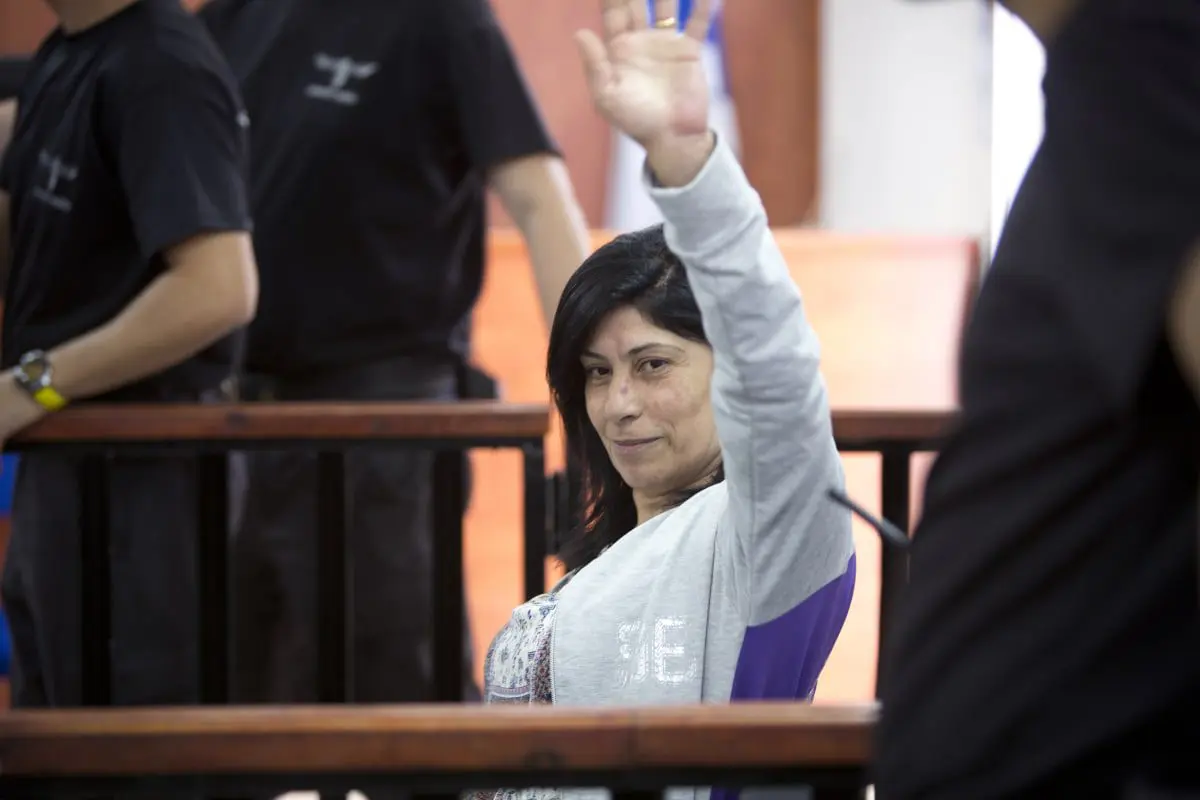
Khalida Jarrar was released on February 28th, 2019 after being arrested by Israel for 20 months.
In the early hours of 2 April 2015, Israeli soldiers broke into the home of Palestinian legislator Khalida Jarrar, arrested her and seized documents, computers and a mobile phone. According to the Israeli army, she had been “actively supporting and encouraging terrorist activities”. The reason given for her arrest was “substantive concerns for the security and safety of the region”. She was incarcerated in HaSharon prison.
Jarrar was born in Nablus in 1963. She has a Master’s degree in Human Rights and Democracy, and has been influential in this field for many years. She has actively advocated for Palestinian prisoners and worked as the director of Addameer, a prisoner’s support and human rights association, from 1993 to 2005, and continues to sit on its board. In addition, she is known for her impassioned support of women’s rights.
In 1998, after returning from the Human Rights Defenders Summit in Paris, Jarrar was prohibited from travelling outside of the Palestinian territories. According to Shin Bet, Israel’s internal security service, she was considered a threat to national security. Due to her physical condition – she had been suffering from deep vein thrombosis – she applied for permission to travel to Amman to undergo a medical treatment that was not available in the West Bank. It took until 2010 for Israel to issue a permit.
Jarrar became a member of the Palestinian Legislative Committee, the body of the Palestinian Authority (PA) in charge of drafting and enacting laws, in 2006. She is also a member of the Popular Front for the Liberation of Palestine (PFLP), a secular, revolutionary leftist organization and the second largest group after Fatah in the Palestinian Liberation Organization. The PFLP is designated a terrorist organization by Israel, the United States, Canada and the European Union.
On 20 August 2014, while at home in Ramallah, Jarrar was given an expulsion order by the Israeli army. It stated that she was, again, considered to be a threat to security and ordered to leave Ramallah for Jericho for six months. She refused, saying, “It is the occupation who must leave our homeland.” She was referring to the Oslo Accords signed in 1993 and 1995 that divide the West Bank into Areas A, B and C. Ramallah is located in Area A and therefore falls completely under the Palestinian government and jurisdiction. Encouraged by activists, who set up an international solidarity campaign, Jarrar appealed against the expulsion. It was reduced from six months to one, but Jarrar never left Ramallah.
Subsequently, she was arrested in April 2015 and held without charge or trial, a practice known as administrative detention. According to Gideon Levy, a journalist and columnist for the left-wing Israeli newspaper Haaretz, this was punishment for her refusal to be deported in 2014. Levy suggested that the Israel Defense Forces were intimidated by the wave of international condemnation and protests over her administrative detention. A trial was subsequently scheduled in an Israeli military court for 4 May and Jarrar was charged with 12 offences varying from “visiting released prisoners”, “membership of an illegal association” (namely the PFLP) and “once inciting the kidnapping of soldiers in order to bring about the release of Palestinian prisoners”. Strikingly, Jarrar has no criminal record, even according to the Israeli authorities.
Jarrar was tried again in a military court on 29 May. The judge eventually released her on a 20,000-shekel bail (about $5,100), plus a third-party bail of the same amount. However, the prosecution appealed the bail and her release was overturned. The next hearing is scheduled for 4 August 2015. In the meantime, Jarrar remains imprisoned. It was not until 29 June that her two daughters were allowed to visit her. All other family members have been denied visiting permits, either because they were “not first-degree relatives” or, as in the case of Jarrar’s husband, on the grounds of undisclosed “security” reasons.


